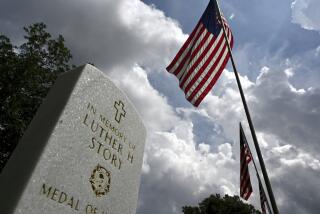William Barber, 82; War Hero
- Share via
Col. William Earl Barber, who was awarded the Medal of Honor during a military career that spanned four decades and three wars in Asia, died in his Irvine home Friday of complications from liver failure and bone marrow cancer, a family spokesman said.
Barber, 82, was awarded the nation’s highest military honor after leading his troops to defend a key pass near the Chosin Reservoir during one of the epic battles of the Korean War, despite being wounded in the leg by machine-gun fire.
Barber’s company held a strip of mountain terrain near the reservoir, close to China’s border, allowing about 8,000 of his fellow soldiers to escape an ambush by the Chinese army.
The battle ranks in Marine history with World War II’s fights over the Pacific islands of Iwo Jima and Guadalcanal and, friends said, is taught in military schools as an example of brilliant defense strategy.
Known to friends as “The Colonel,” Barber first saw combat in Japan in World War II near the beginning of a career that lasted 30 years. But it was his service in the Korean War that brought him the most attention.
Though well-decorated--his medals include two Purple Hearts and the Silver Star--Barber was reticent to discuss his achievements, preferring to dwell on the exploits of others.
“He had a lot of sensitivity, intelligence and humility, but was a warrior at heart,” said Jerry Courtier, the family spokesman and a friend of Barber who plans to write his biography. “You could describe him as a reluctant hero.”
Born Nov. 30, 1919, on a Kentucky farm, Barber joined the Marine Corps at 20. He spent the first part of World War II as a weapons instructor at mainland bases, including Camp Pendleton, then went to the Pacific Theater in 1944 as a first lieutenant leading a platoon in Company E, 2nd Battalion, 26th Marine Regiment.
When his commander was wounded, Barber took charge of the company and led it for the last three weeks of the campaign. He was wounded as he crawled through enemy fire to rescue two fallen comrades, Courtier said.
Barber’s actions earned him the Silver Star for bravery and the Purple Heart for his wounds.
Barber was promoted to captain before being assigned to the 1st Marine Division in Korea in October 1950. He took command of Company F, 2nd Battalion, 7th Marine Regiment.
In November 1950, Barber and 220 soldiers in Fox Company were among a contingent of Marines near the Chosin Reservoir when it was ambushed by the Chinese army, which was joining the war on the side of the North Koreans.
For thousands of U.S. troops, the only escape was through a narrow pass that Barber’s company was ordered to defend at all cost.
Outnumbered at least 10 to 1, Barber’s troops withstood repeated assaults over five days in freezing weather. At one point, Barber received orders to pull back but asked permission to remain and try to hold out.
“I knew that we could probably hold, and I knew that if we didn’t hold, we could exact a very heavy toll,” he recalled in a 1976 interview. At the end of the battle, only 82 of Barber’s soldiers could walk away.
Barber remained in the Marines and was awarded the Legion of Merit for service in Vietnam before retiring as a full colonel in 1970.
Barber is survived by his wife, Ione; a son, John; a daughter, Sharon; and three granddaughters.
This obituary ran in some editions of The Times on Sunday.
More to Read
Sign up for Essential California
The most important California stories and recommendations in your inbox every morning.
You may occasionally receive promotional content from the Los Angeles Times.














